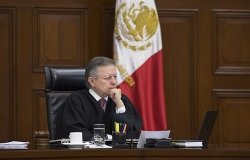The Crisis in the Arab World's Aging Leadership
David Ottaway, Senior Scholar, Woodrow Wilson Center, and Former Cairo Bureau Chief, The Washington Post
Overview
With eight Arab kings and presidents over 65 years of age, the Arab world faces pressing questions about upcoming transitions and issues of succession. David Ottaway, a former Washington Post correspondent and investigative reporter with over 40 years of experience reporting on the Middle East, addressed these issues and challenged some fundamental assumptions regarding the transition of power.
On January 5, 2011 the Middle East Program hosted a meeting on "The Crisis in the Arab World's Aging Leadership" with Ottaway, currently a Senior Scholar at the Wilson Center. Haleh Esfandiari, Director of the Middle East Program at the Woodrow Wilson Center, moderated the event.
Ottaway suggested rethinking three fundamental assumptions about succession and the transition of power in the Arab world: 1) aging leaders are "stuck in their ways" and resistant to reform, 2) younger Arab leaders of the "new generation" are more open to reform because they tend to be better educated and more in touch with the current state of affairs in their respective countries, and 3) succession will inevitably provoke instability. Drawing upon his research, Ottaway challenged each of these assumptions in turn.
According to Ottaway, leaders such as former King Hassan II of Morocco and King Abdullah of Saudi Arabia help disprove the assumption that aging leaders tend toward political stagnation. He cited Hassan's restructuring of the Moroccan political system and Abdullah's economic, political, and social reforms as evidence that aging leaders can sow the seeds of change and suggested that age may be less important than "character, vision, grit, and courage" in determining the course of a leader's policies.
Although the new generation of Arab leaders showed indications of reform upon assuming power, Ottaway claimed many of them have fallen back on more conservative policies and massive security systems to remain in power. He cited as an example King Abdullah II of Jordan, who initially called for the formation of a reform agenda but abandoned this plan under conservative pressure and has since begun to clamp down on the media. Ottaway also noted shifts in the policies of Bashar el-Assad of Syria and King Mohammed VI of Morocco away from their initial reformist platforms. He concluded that youth should not be considered a key to reform.
Ottaway examined the cases of succession in Saudi Arabia and Egypt in depth and analyzed the assumption that succession inevitably causes instability. He reminded the audience that in 2006 reform by King Abdullah of Saudi Arabia created an Allegiance Commission of 35 Saudi princes charged with working with the King to choose the next crown prince. While Ottaway expects there to be dissent within the Allegiance Commission and the royal family over the succession decision, he doubts there will be turbulence among the general population. In Egypt, by contrast, Ottaway expects increasing political and sectarian disturbances in regards to the succession of President Hosni Mubarak. Mubarak appears to be grooming his son Gamal for the Egyptian presidency, but Ottaway identified a number of liabilities facing Gamal, including the lack of military support for his candidacy and the appearance of several other contenders for the presidency. Ottaway predicts supporters of prominent opposition groups such as the Muslim Brotherhood may stage large and possibly violent demonstrations if they feel shut out of the political process of choosing the successor.
By Abby Arganese, Middle East Program
Haleh Esfandiari, Middle East Program
Documents & Downloads
Speaker

Hosted By

Middle East Program
The Wilson Center’s Middle East Program serves as a crucial resource for the policymaking community and beyond, providing analyses and research that helps inform US foreign policymaking, stimulates public debate, and expands knowledge about issues in the wider Middle East and North Africa (MENA) region. Read more
Thank you for your interest in this event. Please send any feedback or questions to our Events staff.









